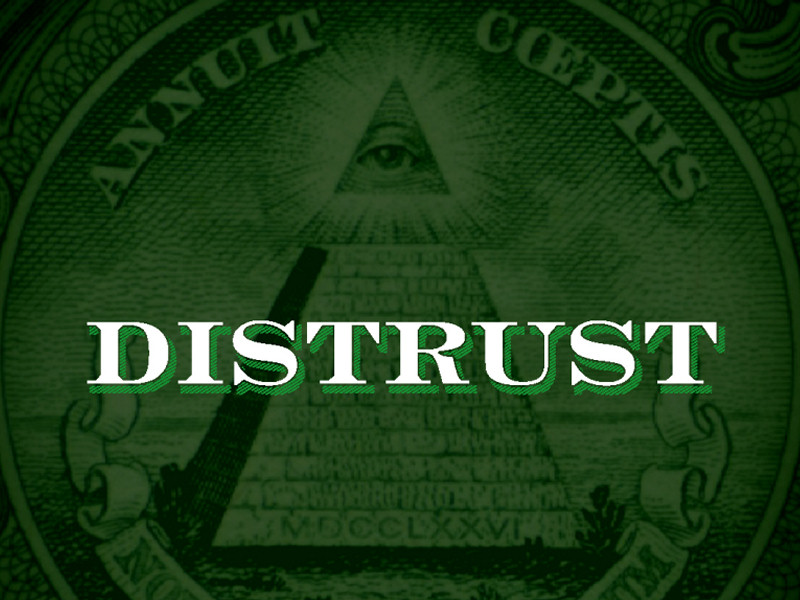
The Pew Research Center released a massive poll Monday detailing how Americans view their government. The short answer? Not well.
One chart in the reams of awesome data stood out as a terrific lens through which to understand the current state of our politics — particularly the Republican presidential race. Here it is:
Less than one in five people (19 percent) say they trust the government to do what is right «always» or «most of the time.» That number has been in steady decline almost since the question was first asked in 1958; at the time, three quarters of the public (73 percent) thought they could trust the government to do the right thing most or all of the time. With occasional surges in the mid-1980s and then again in the early 2000s — almost entirely attributable to the rally-around-the-flag effect in the wake of the attacks of Sept. 11, 2001 — the trajectory on trust has been almost exclusively downward over the past five and a half decades.
If 80 percent (or so) of the American people have little or no faith in their government and their elected officials to make the right choices most of the time, it’s clear that the system isn’t working. And it’s not hard to understand why voters — on the left and the right — would be drawn to candidates who put blowing up that system at the heart of their campaigns.
Dig deeper into the Pew poll and you understand why Bernie Sanders appears to have reached a ceiling of sorts in the Democratic primary contest while Donald Trump continues to confound his critics by leading the GOP race. Here’s that same chart above but broken down by party:
Two things: 1) Republicans’ trust in government yo-yo’s depending on whose in office far more than Democrats. Republicans trust government more when a Republican president is in the White House; Democrats, generally, trust government roughly equally no matter which party controls the White House and 2) Republican trust in government is at an all-time low with just 13 percent currently saying they think the government makes the right decisions always or most of the time. Compare that to 25 percent of Republicans who said the same during the eight years Bill Clinton was in office and you begin to grasp the depth and the historic nature of Republican discontent.
Looking at that chart, you also begin to grasp why Trump has found such fertile ground for his message that everything and everyone in Washington is corrupt and terrible and needs to be gotten rid of. And, distrust in government is only a piece of the broader puzzle that Trump appears to have solved.
Virtually every institution — from government to banks to the church to media — is at or near a historic low point in terms of the trust Americans have in them. Why? The collapse of the economy amid the bank collapse of the last decade. September 11. The Catholic church sex scandal. A government shutdown.
Add it all up and the sense that the institutions we have always depended on are no longer so dependable becomes pervasive. The safety net is gone. The old ways of doing things no longer work but no new way of doing things has emerged.
People react differently to that new normal but usually it’s some combination of fear, anxiety and anger. That can be a very toxic mixture in the context of a political campaign in which candidates are doing their best to convince people to vote for them based on a demonstrated ability to empathize/channel how they are feeling.
Most candidates seek to acknowledge those frustrations and fears while trying to quickly pivot toward a more optimistic message along the lines of «We can do this. We always have.» Trump represents a break with that approach. His strategy is to not only acknowledge the negative feelings coursing through the public but to stoke them. Trump’s message, boiled down, is «You’re angry. You should be angry. I am angry too. We shouldn’t get less angry. What we should do is use that anger to take back the country we love.»
It’s a message that is uniquely well suited to our troubled times. When you don’t believe or trust almost anyone or anything, a man willing to say exactly what he thinks at all times and damn the torpedoes is very very appealing.
Simply put: Donald Trump is the living breathing manifestation of where much of the country is right now. He is a mirror held up to all of us.



Expositores: Oscar Vidarte (PUCP) Fernando González Vigil (Universidad del Pacífico) Inscripciones aquí. Leer más
Una retrospectiva para entender los próximos cuatro años. Leer más
En la conferencia se hará una presentación de los temas más relevantes del proceso de negociación se llevó a cabo desde el 2012, así como del acuerdo de paz firmado entre el Gobierno colombiano y la guerrilla de las FARC a finales del 2016. Se analizarán los desafíos y las... Leer más
El Observatorio de las Relaciones Peruano-Norteamericanas (ORPN) de la Universidad del Pacífico es un programa encargado de analizar y difundir información relevante sobre la situación política, económica y social de Estados Unidos y analizar, desde una perspectiva multidisciplinaria, su efecto en las relaciones bilaterales con el Perú.
© 2026 Universidad del Pacífico - Departamento Académico de Humanidades. Todos los derechos reservados.

